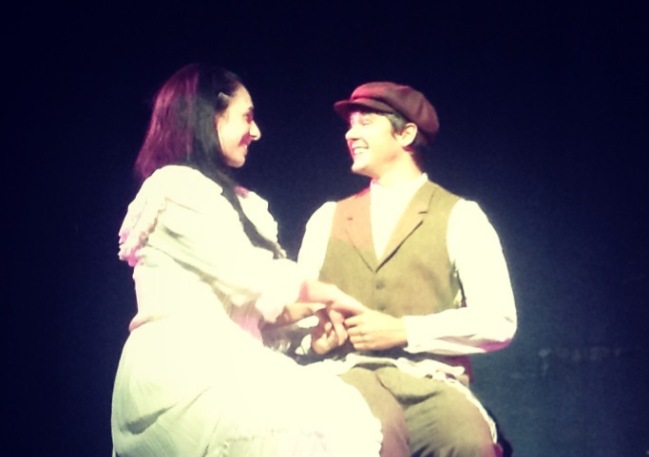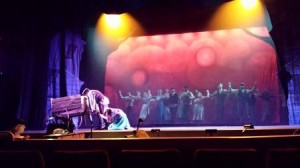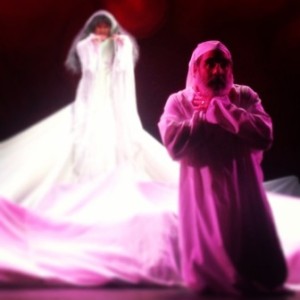The Off Broad Street Players’ production of FIDDLER ON THE ROOF in final dress shows great promise. It has a real “fiddler” on the roof! And, since it was not opening night, the OBSP gets a pass on fiery criticism because the bugs, which were mostly technical, will be worked out by opening night and my words by then will be meaningless.
What I saw during the dress rehearsal impressed me. The set was relatively simple, downsized to fit an entire village, like furniture purposely made smaller to make the apartment look bigger, and in this case, to allow ample room for dancing. So, the set impressed me. This big of a show on any stage is difficult enough. The choreography by John T. Stephan was spot on and looked well-rehearsed, and the costumes were more colorful than usual, but consistent. Tzeitel (Leigh Anne Johnson), Hodel (Alexis Lounsbury), and Chava (Leanne Cox) were well cast and hit every beautiful note. Tevye (Richard Curcio) and Golde (Patty Kraus-Davis) were fine singers as well.
To be absolutely honest, my first very positive impression was seeing The Levoy Theater itself, lovely inside and out, with a decent size stage. By most community theatre standards it is a theater to die for.
This is one of the best community theatre productions of FIDDLER ON THE ROOF that I’ve seen. And, it would do well if matched with a professional production. Sure, there would be differences. Although not as taut and fit as a professional show, this OBSP production would still be entertaining and wonderfully sung. There simply can’t be the same standards. No one likes the term “just community theatre;” however, it’s not fair to hold community theatre to the same standard of performance. Professional theatre actors may rehearse all day four or five days a week, while community theatre actors may have full-time jobs or go to school and rehearse for a few hours in the evening three (or four in some states) times a week. Their hearts are in it, but other duties call, too.
One thing community theatre has that the professional theatre doesn’t is the support of the community. Some theatres cast everyone that auditions, running the risk of over-filling their stages, but that is one way to support the community in return. Other theatres like OBSP enlist the aid of the community in other aspects of the theatre. Community and theatre working together is important. The Levoy Theater would not be standing if not for the joint efforts of the Off Broad Street Players and the local community.
FIDDLER ON THE ROOF has been around a long time and will be around a lot longer. Its story of tradition and change is universal. The Fiddler is a metaphor for survival through tradition and joyfulness in a world full of uncertainty and imbalance. This Fiddler (Adam White) plays while balanced on the roof. At times he comes to earth to taunt Tevye, who has had the misfortune of having five daughters. Three of these daughters decide to break with tradition and Tevye’s world is turned upside down.
FIDDLER ON THE ROOF was one of the first mega-hits on Broadway in 1964, the West End in 1967, and everywhere else. It played for 3,242 performances in its first run. It was nominated for ten Tony Awards and won nine. Zero Mostel was the first Tevye on Broadway and Chaim Topol on the West End, where FIDDLER played over 2,000 performances. Topol is the actor, most associated with the role and went on to play Tevye in revivals over the next four decades as well as star in the 1971 film.
The light and sound operators are nervous as is the director. The show is still the director’s “baby” until opening night when the responsibility for what happens on stage will be passed to the stage manager. This night was a tough one for the director, Walter A. Webster, in that the microphones that worked perfectly on Tuesday were not working on Thursday. In fact, I thought “Tevye” played with much gusto and a spitting image of Topol from where I was sitting, started slow and mellow until he came blasting out later. When you are on stage, you don’t know if the mic is working or not. It has become more and more the custom to use mics especially for the main singers in musicals, but with that comes added responsibility of watching where you attach the mics, should they be bumped in any way…
There was some staging early on that bothered me. Tevye seemed to dominate down stage right or down center a lot, then other actors seemed to occupy that same areas. I thought at first this may have been overhead stage mics. I would like to have seen Tevye move more on the stage, but I can understand if it was a sound or lighting problem. I would like to have seen more distance between Tevye and his “defecting” daughters when he’s talking about them to God. I think that separation is important emphasize that he and his daughter(s) are breaking with tradition. The next couple of items are probably more preference than anything else. I’m not big on crowd scenes, especially if they aren’t needed in a play as long as this one. I understand wanting to give everyone more to do, but I would have cut the gossip scene. The next scene is more dynamic and repeats everything that is whispered in the previous scene.
The music is Jerry Bock’s and Sheldon Harnick’s fault; they wrote the original music and lyrics respectively. I love almost all of the music in FIDDLER. I can’t say that about too many musicals. The one song that seems out of place is Perchik’s and Hodel’s song, “Now I Have Everything.” Most productions that I have seen have cut it completely or modified so it is sung by Hodel only. I never liked it when I sang it; I asked the director to cut it when I did the show eons ago. As I said, that’s a preference, an opinion, so you may love it.
The ending seemed a little flat to me and I don’t know if it was a technical problem or not. “Sunrise, Sunset” is powerful song, not of defeat, but of pushing ahead to survive somewhere else again and again. The title of the song provides a hint for background, a scrim or light gels to paint the scene orange as a sunrise or sunset, adding atmosphere that seemed to missing.
There’s an old saying in theatre: “bad dress rehearsal, good opening night.” I believe it here. It’s obvious that these actors worked hard. The tech people worked hard. I’m sure everyone went back to work after I left. The musicians don’t get near enough praise. Not being a musician, I can’t judge. They sounded great to me.
Having been on both sides of the stage for a final dress, the actors on stage get the butterflies they never had in rehearsals; it doesn’t matter if there are only a few audience members. Secretly, the actors hope for more. A full house, although for a dress rehearsal seems unrealistic, would be perfect. To the actors, more audience members mean more energy for them. Even if actors can’t see passed the first or second row (and they shouldn’t be looking anyway) they can feel you out there–they need you out there.
It was a good night. A different experience. It’s been a while since I directed a show. Not as long since I’ve acted in one so I still remember the feeling of the final dress rehearsal. Off Broad Street Player’s production of FIDDLER ON THE ROOF warrants praise–much praise for doing such a wonderful show as FIDDLER ON THE ROOF. I’m sure my nitpicking would not have been the same on opening night and even if it were, it would still be a show worth seeing. This review in itself is from a different perspective. It is from the night before the show opens. Here’s an interesting note. On Broadway, a show doesn’t open officially until it has played successfully to a number of happily satisfied audiences. Here, we don’t have that advantage. Break legs, everyone!
FIDDLER ON THE ROOF
Music by Jerry Bock
Lyrics by Sheldon Harnick
Book by Joseph Stein
Stage and Musical Direction by Walter A. Webster
Choreographed by John T. Stephan
August 2-11, 2013
Fridays and Saturdays at 8:00 pm
Sundays at 3:00 pm
August 8, Thursday at 7:30
Off Broad Street Players
at The Levoy Theater
130 N. High Street
Millville, NJ 08332
(856) 451-4537
http://www.obsp.org





1 comment
The original Broadway production of the show, which opened in 1964, had the first musical theatre run in history to surpass 3,000 performances. Fiddler held the record for the longest-running Broadway musical for almost ten years until Grease surpassed its run. It remains Broadway’s fifteenth longest-running show in history. The production was extraordinarily profitable and highly acclaimed. It was nominated for ten Tony Awards, winning nine including Best Musical, Score, Book, Direction, and Choreography. It spawned four Broadway revivals, a successful 1971 film adaptation, and the show has enjoyed enduring international popularity. It is also a very popular choice for school and community productions.